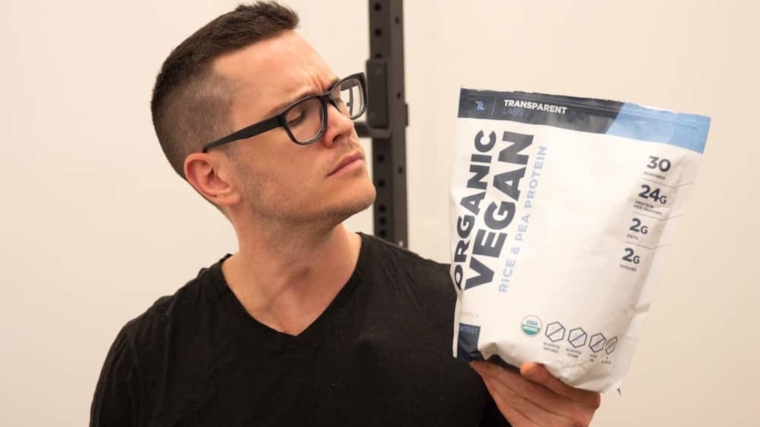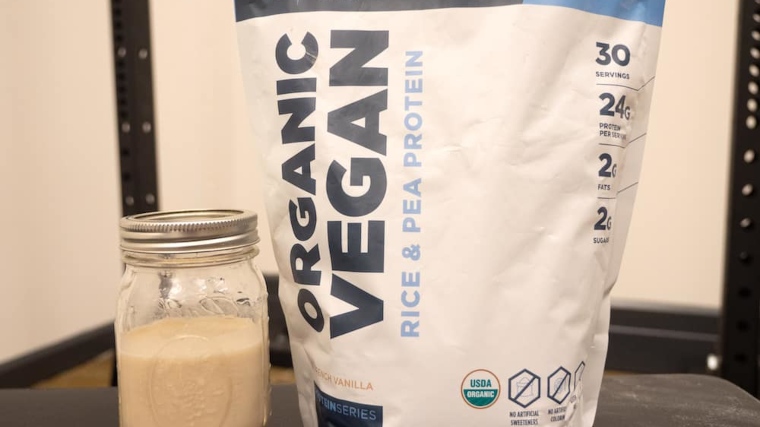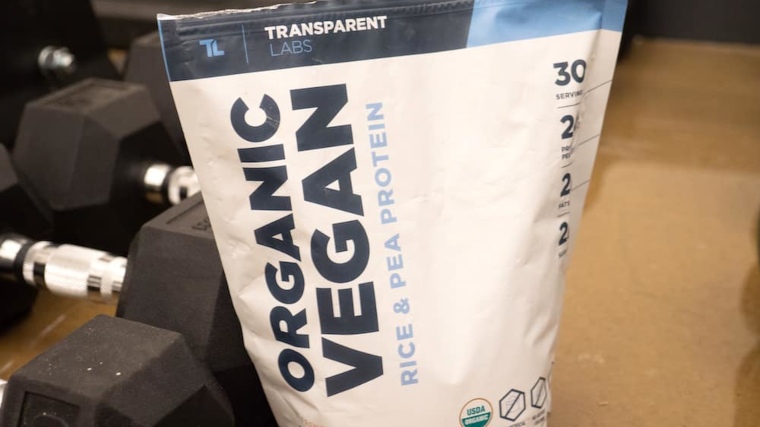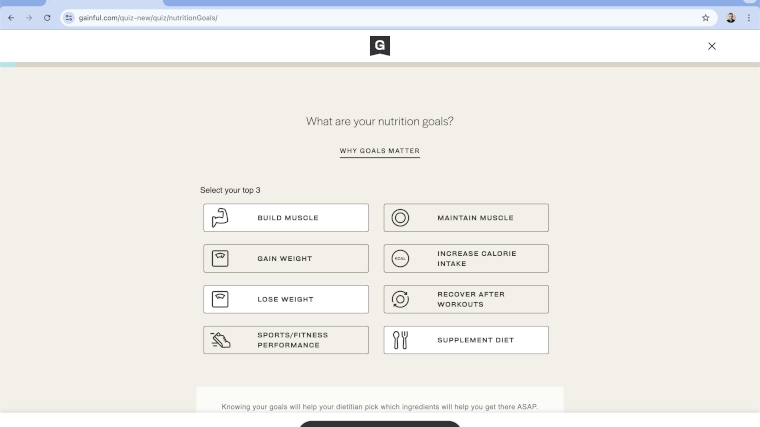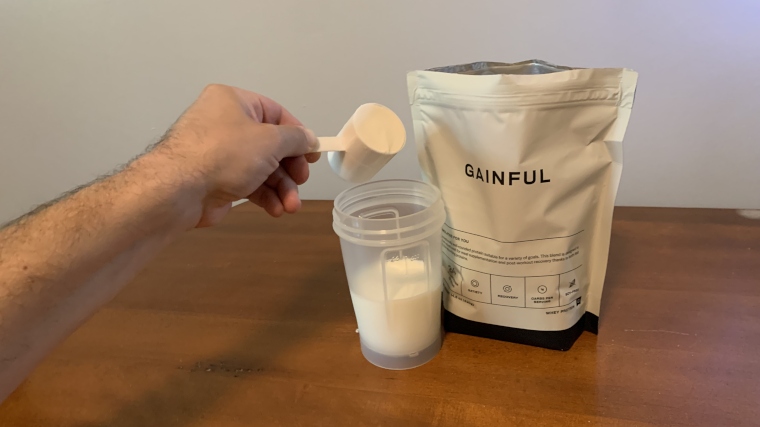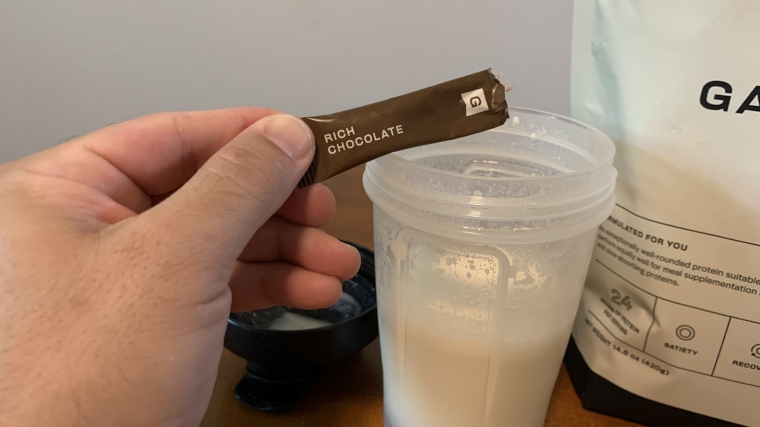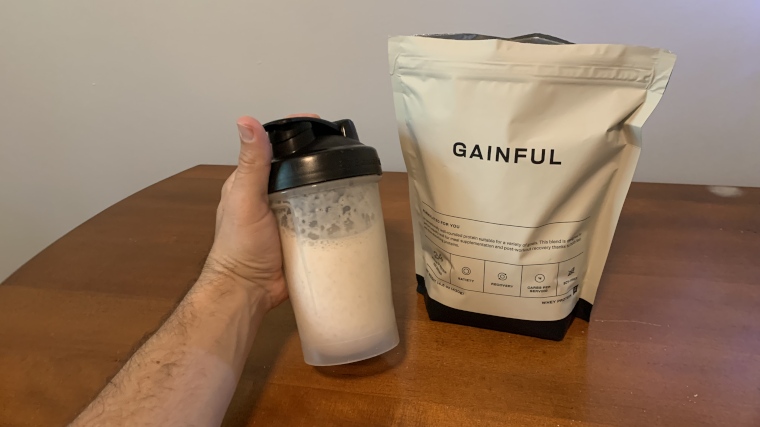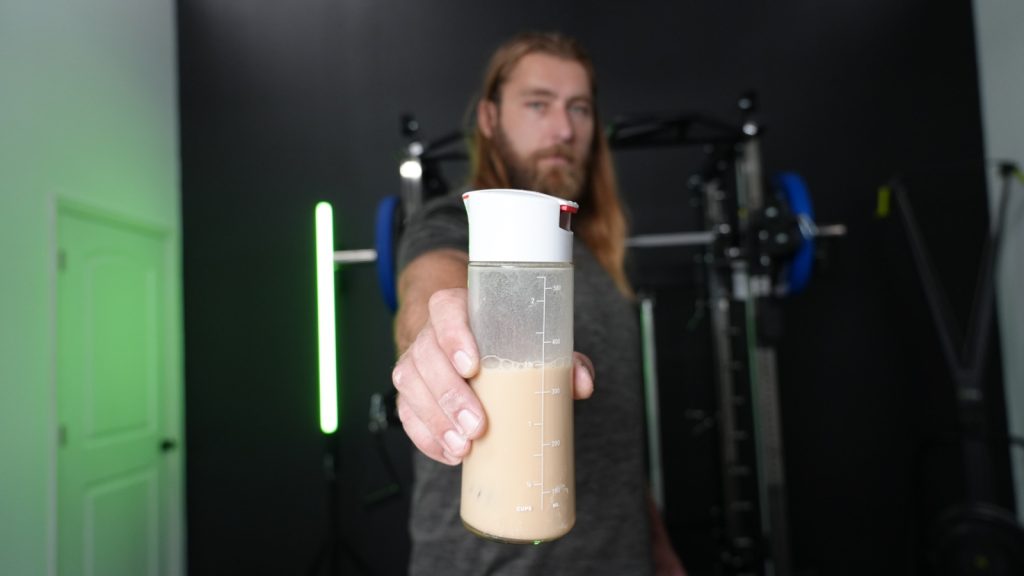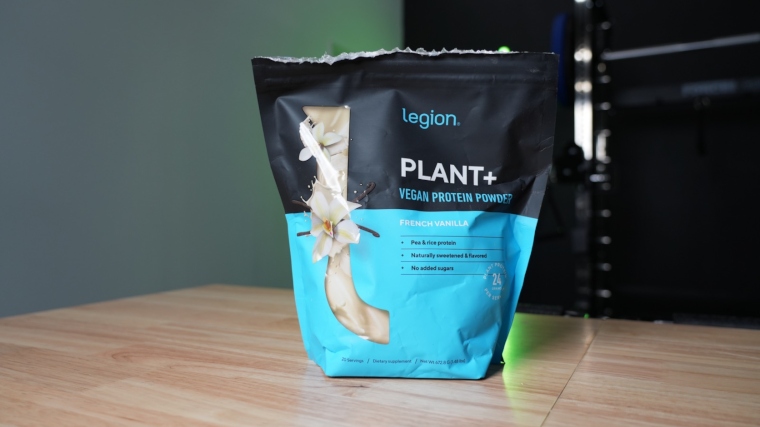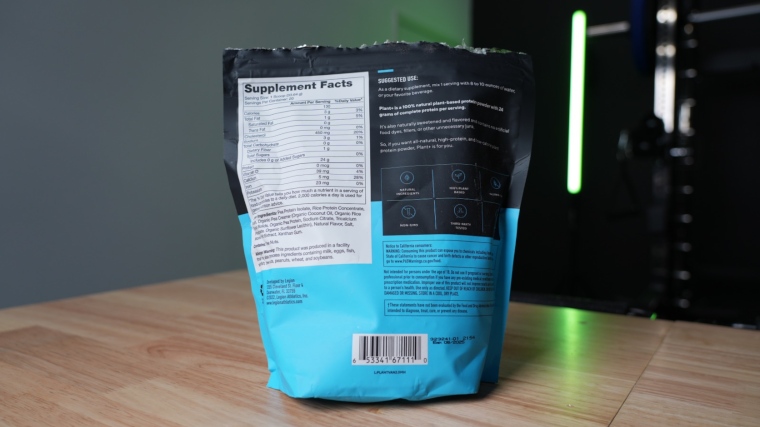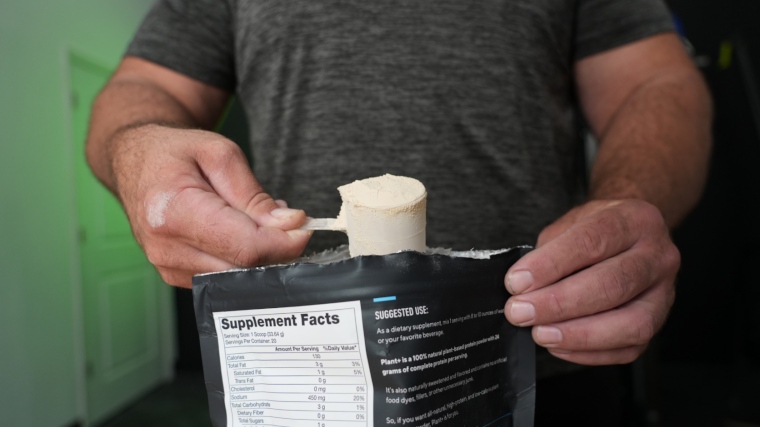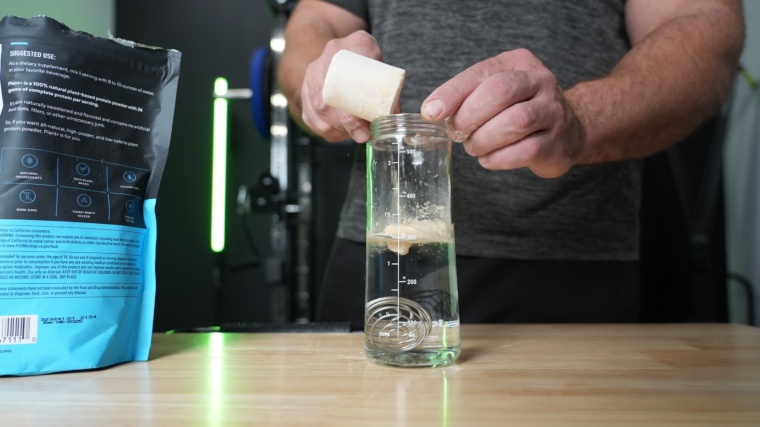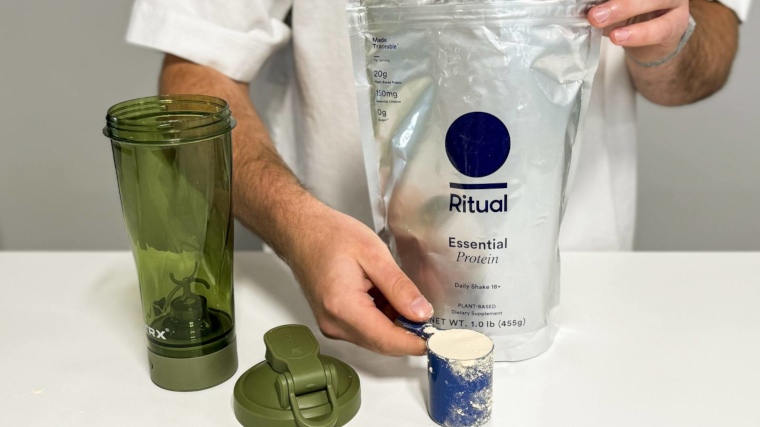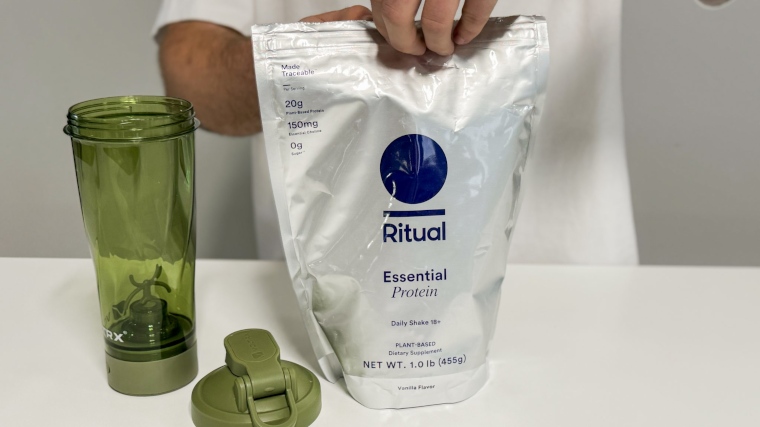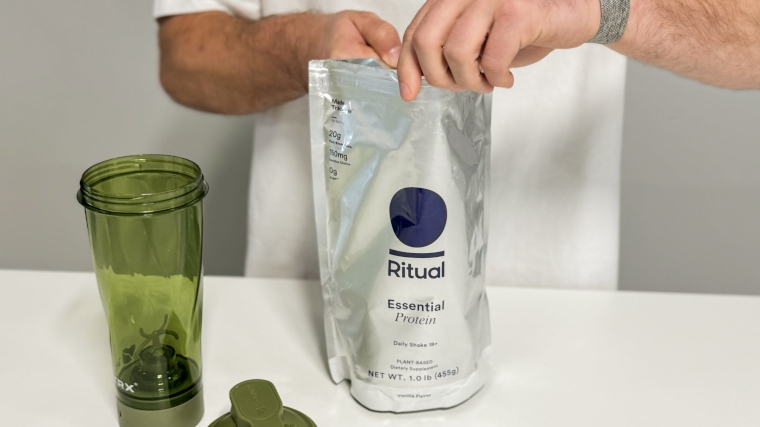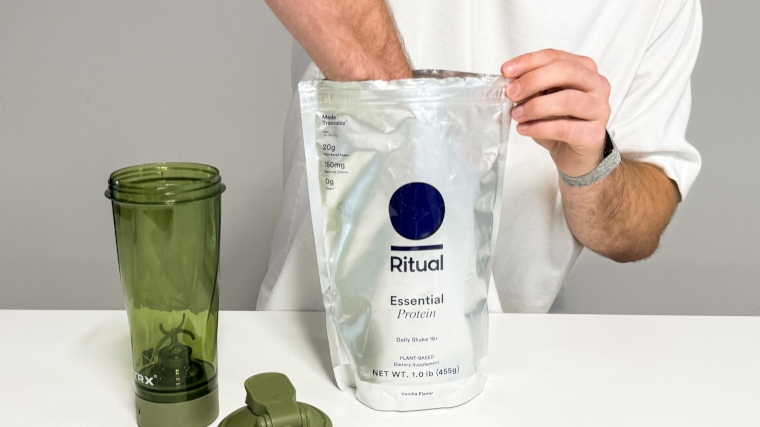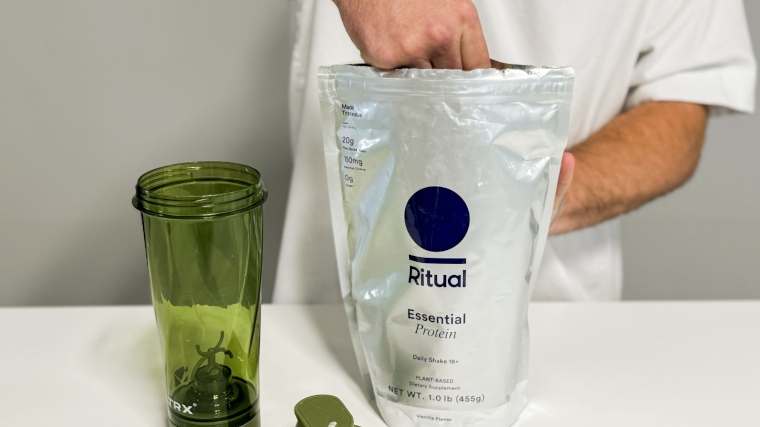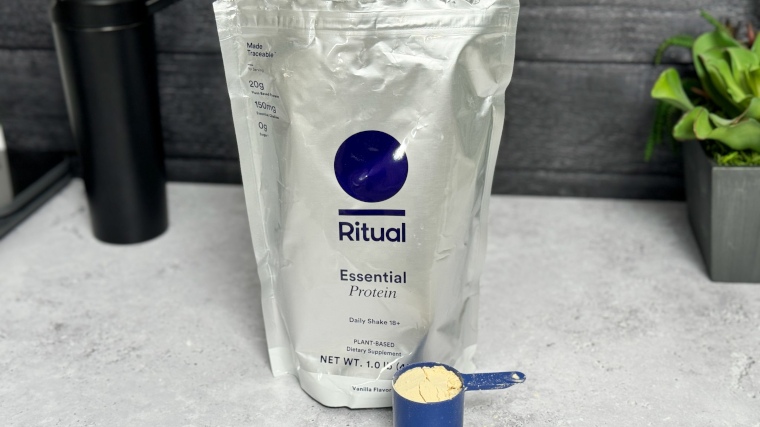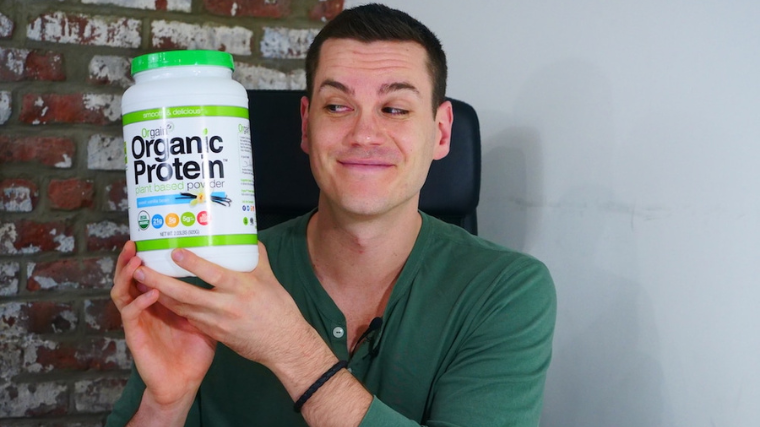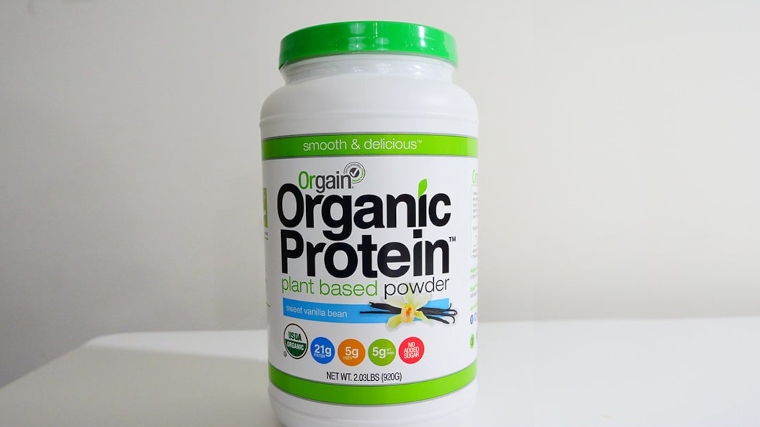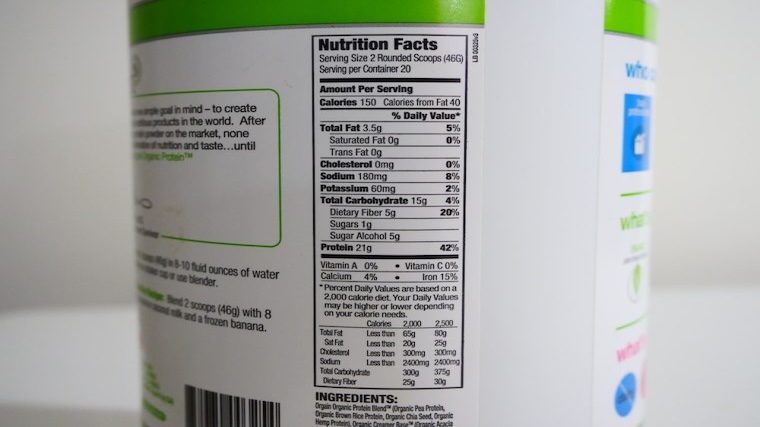If you’re looking for a plant-based protein that’s packed with protein and is also planet-friendly, pea protein powder might just be your new best friend. For those with a dairy-free or plant-based lifestyle, pea protein has earned its place as one of the best protein powders out there, often beating out soy and pumpkin seed protein powders — and even animal-based powders. But with so many brands and options out there, how do you know which are the best pea protein powders?
In this guide, we’re going to dive into the vibrant world of pea protein powders. Here at BarBend, our expert team of nutrition and fitness experts have tested over 100 protein powders to bring you the best of the best. You’ll also learn what makes this tiny legume such a powerhouse to how to choose the best one for your specific needs. And of course, we’ve done the hard work of tasting, researching, and ranking the top contenders across various categories. Whether you’re after the best tasting, the most budget-friendly, or the cleanest, we’ve got you covered. So, grab your shaker bottle, and let’s get started!
The Best Pea Protein Powders of 2025
- Best Overall Pea Protein Powder: Transparent Labs Rice & Pea Protein
- Best Tasting Pea Protein Powder: Gainful Plant-Based Protein Powder
- Best Budget Pea Protein Powder: Nutricost Organic Pea Protein Isolate
- Best Pea Protein Powder for Muscle Gain: Transparent Labs Vegan Mass Gainer
- Best High-Protein Pea Protein Powder: Legion Plant+
- Best Pea Protein Powder for Athletes: Ritual Essential Protein 18+
- Best Unflavored Pea Protein Powder: Bulk Supplements Pea Protein Isolate
- Best Organic Pea Protein Powder: Orgain Organic Vegan Protein Powder
Editor’s note: The content on BarBend is meant to be informative in nature, but it should not be taken as medical advice. The opinions and articles on this site are not intended for use as diagnosis, prevention, and/or treatment of health problems. It’s always a good idea to talk to your doctor before beginning a new fitness, nutritional, and/or supplement routine. Individual needs for vitamins and minerals will vary.
How We Tested and Chose the Best Pea Protein Powders
The BarBend team is dedicated to bringing you all the information you need so that you can decide which supplement is best for you. Our team is made up of certified trainers, nutrition coaches, and athletes. We also rely on the support of registered dietitians and recent studies to ensure the safety and efficacy of each supplement.
We tested over 100 different protein powders to share the best of the bunch with you. For more information on how we test products, you can read our supplement methodology page. Below, we’ve compiled a brief list of what factors we’re looking at when trying everything.
- Protein: We are testing proteins after all, so it’s important that each protein powder we looked at and tested has a solid amount of protein in each without a bunch of extra additives. We also look at whether protein sources were complete, meaning they contain all essential amino acids.
- Formulation: How the supplement is made and what goes into it is essential in understanding whether you should invest in a supplement or not.
- Third-Party Testing: The Food and Drug Administration (FDA) doesn’t regulate dietary supplements, so third-party testing is essential for transparency, ensuring that these supplements contain what companies advertise and remain free from contaminants.
- Taste: A supplement may have the best ingredients ever, but why would you drink it if it doesn’t taste good? Taste and flavor are essential parts of what makes a protein powder worthwhile, especially pea proteins, which are known to have a distinct (and somewhat odd) flavor and texture.
- Solubility: A supplement’s ability to mix well into water or milk is a critical part of the drinking experience. Pea proteins are known to be difficult to mix thoroughly, so this is definitely something we want to ensure before recommending.
Best Overall Pea Protein Powder: Transparent Labs Rice & Pea Protein
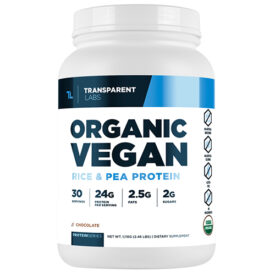
A surprisingly delicious vegan protein powder that's totally free from artificial ingredients and soy, Transparent Labs Organic Vegan Protein contains a 2:1 ratio of rice to pea protein powder, and 4 grams of fiber.
Specs
- Protein Per Serving: 24g
- Calories Per Serving: 130
- Key Ingredients: Organic rice protein concentrate, organic pea protein isolate, natural flavors, salt, stevia
- Third-Party Tested: Yes
- Flavors: French Vanilla, Chocolate
- Added Sugar: 0g
- Price Per Serving: $1.67 or $1.50 with a subscription
Our pick for best overall protein is Transparent Labs Rice & Pea Protein. As a certified nutrition coach, I like that it’s a complete profile of all essential amino acids. It can be difficult to get all the essential amino acids with dairy-free protein powders, and your body needs all nine for a number of health benefits. (1)
Another great feature of this protein powder is that it’s third-party tested. You can find the results of these tests directly from the website. Supplements are not regulated by the FDA, so third-party testing holds supplement companies accountable, ensuring that their products only include what they say they do on the label.
Our certified nutrition coach expert testers have mixed reviews about the flavor of this protein powder, specifically calling out the stevia taste. One of these testers gives it a 2 out of 5 and remarks that, “It tastes very artificial for a vanilla flavor. Maybe it’s the stevia? I would not drink this plain. It also smells gross; not to the point where I think there’s something wrong with the batch, but more than expected.”
But our other expert tester rates it a 3 out of 5 saying: “Not too bad for a vegan protein powder; it tastes like a dark chocolate drink (not milk chocolate), but with an earthy hint because of the rice and pea protein. I would not suggest this for people who like sweet/sugary protein drinks. There is not that much sugar and you can really taste the cocoa powder.”
A common feature of non-whey proteins is the lack of solubility and distinct texture and mouth feel. Transparent’s Rice & Pea Protein is not immune to these features. One of our expert testers describes it as “… not gritty but there is more residue/film in the shaker and I can feel that extra texture in my mouth, too. It’s kind of like you can feel the cocoa powder. It’s really not terrible but it’s not comparable to whey.” They give it a 4 out of 5 overall.
Read our full Transparent Labs Vegan Rice & Pea Protein Review.
Best Tasting Pea Protein Powder: Gainful Plant-Based Protein Powder
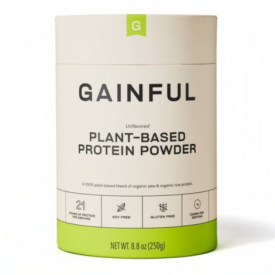
Gainful Plant-Based Protein Powder offers up to 24 grams of organic brown rice and pea protein, which delivers a complete amino acid profile. Right now, take 50% off your first order with the code: BF50.
Specs
- Protein Per Serving: 20-24g
- Calories Per Serving: 120-130
- Key Ingredients: Organic pea protein, organic brown rice protein, green tea extract
- Third-Party Tested: No
- Flavors: Comes unflavored but can add packets: Sea Salt Caramel, Rich Chocolate, Cinnamon Toast, Madagascar Vanilla, Strawberry Cream, Chocolate Peanut Butter, Cookies & Cream, Caffe Mocha
- Added Sugar: between 0g and < 1g
- Price Per Serving: $3.21
With customizable flavor packets, it’s no wonder why we picked Gainful Plant-Based Protein Powder as our best-tasting protein powder. The protein comes unflavored with eight separate single-serve flavor packets to choose from. You can switch it up day by day. As a nutrition coach, I like this variability because sometimes reaching your macros can become mundane and repetitive — but the variety helps freshen up your routine.
As a nutrition coach, I also like the ability to pick a protein powder based on your performance goals. You can choose between three options: weight loss, weight gain, and muscle gain. The main difference is that the “weight loss” option has more protein than the other two, and the weight gain and muscle gain contain organic gluten-free oat powder.
Chelsea Rae Bourgeois, a registered dietitian and our expert reviewer agrees, saying: “I like the idea of a personalized protein powder that caters to your fitness needs and health goals. I took the quiz to formulate a protein powder according to my goals, and the resulting formula was pretty spot on. But is there a comparable, more cost-effective option out there? Probably.”
As Bourgeois mentioned, Gainful is expensive. It also requires a subscription to purchase. Buying in bulk does save you more, but if that’s worth it depends on how often you use it. Overall, Bourgeois scores Gainful 4.5 out of 5.
Alex Polish, a certified personal trainer and member of BarBend’s editorial team, gives it a 4.5 out of 5 overall and says: “I like that you gain (get it?) access to an RD via text or email when you make a purchase, but I definitely raised my eyebrows because a purchase automatically locks you into a subscription. I get it — they make a convincing argument on their packaging that when you’re actively using supplements, you’re more likely to stick to your fitness plan — but I like to be able to test things out without bolting awake at 3 am wondering if I forgot to cancel my subscription before the next payment. And these are expensive.”
Read our full Gainful Protein Powder Review.
Best Budget Pea Protein Powder: Nutricost Organic Pea Protein Isolate
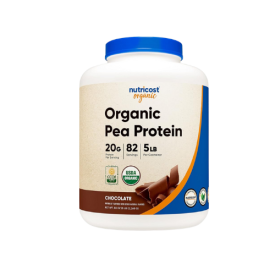
Nutricost Organic Pea Protein is certified organic and comes in a 5-pound tub to make sure you'll have your protein needs met for 82 servings before needing to restock.
Specs
- Protein Per Serving: 20g
- Calories Per Serving: 100
- Key Ingredients: Organic pea protein isolate, organic natural flavors, Himalayan rock salt, organic stevia
- Third-Party Tested: Yes
- Flavors: Vanilla and Unflavored
- Added Sugar: 0 g
- Price Per Serving: $0.38 or $0.31 with a subscription
We chose Nutricost Organic Pea Protein Isolate as our budget-friendly pick because you won’t find another option that is more affordable with such great ingredients. Containing only two vegan protein powders, salt, and stevia, I like that this formula makes Nutricost’s vegan protein a great option for a quick snack or as a foundation for a hearty protein shake. I am impressed that the cost is so reasonable for a USDA-certified organic pea protein powder.
Users report that the texture can be chalky and hard to dissolve, which can make it a great choice for blending into smoothies and protein shakes. As a nutrition coach, I like this for individuals with high protein goals. With 20 grams of protein, 2 grams of fat, and 1 gram of carbohydrates, this simple formula will help you hit protein goals without adding too much of anything else.
This can be great for individuals who want to lose weight, as a high protein diet is satiating and it takes a while to digest keeping you full for longer. Plus, protein is key for hypertrophy — that is, building muscle — which can help you burn more calories at rest.
Not only is Nutritcost third-party tested, but it’s also GMP Compliant. This standard is granted to manufacturing facilities that meet industry-standard quality specifications. To earn and maintain this label, Nutricost has to ensure they consistently produce high-quality, safe, reliable, and ethical products that meet FDA mandates.
As a certified nutrition coach, that GMP compliance is important to me, as is the fact that all of their ingredients are certified organic. For such an affordable protein powder, this is quite an impressive feat. Few supplement companies conduct third-party testing, and even fewer have both that testing and GMP compliance.
An added bonus of Nutricost’s Organic Pea Protein Isolate? For the aspiring fitness influencers out there, you can apply for their ambassador program straight from their website.
Best Pea Protein Powder for Muscle Gain: Transparent Labs Vegan Mass Gainer
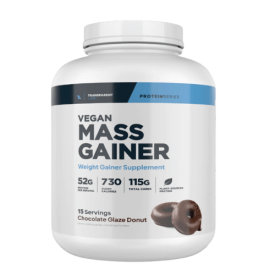
Transparent Labs Vegan Mass Gainer is ideal for athletes following a plant-based diet who also want to put on some mass. This supplement is made with a pea protein isolate and zero animal products.
Specs
- Protein Per Serving: 50-52g
- Calories Per Serving: 710
- Key Ingredients: Organic tapioca maltodextrin, pea protein isolate, coconut milk powder, MCT oil powder, VitaFiber, creatine monohydrate, natural flavors, oat flour, sweet potato powder, stevia extract, tree nuts
- Third-Party Tested: Yes
- Flavors: Vanilla Cupcake
- Added Sugar: 0 g
- Price Per Serving: $5.33 or $4.80 with a subscription
Transparent Labs Vegan Mass Gainer protein powder is the overall best muscle gainer pea protein powder because it’s packed with a whopping 50 grams of protein, 110 grams of carbs, 9 grams of fat, and 710 calories. This protein powder can serve essentially as a meal replacement. Because the serving size is two scoops, you can also opt to have a smaller serving, as a snack instead of a full 710-calorie (plus milk) meal.
As a certified nutrition coach, I like the inclusion of coconut milk powder, MCT oil powder, a fiber source, creatine monohydrate, and sweet potato powder. These ingredients are a great source of healthy fats and carbohydrates that will help you bulk and build muscle mass. This is a great option for intense athletes and those trying to build muscle.
I also like this as an on-the-go meal option. No time for meal prep or traveling and looking for a quick, easy meal? With all those calories per serving, one scoop is enough for a meal for most individuals — so if you’re on the road, or at the airport, this is a great way to get the calories you need without having to think about your macros.
On the other hand, I’m disappointed that this protein supplement doesn’t contain a blend of vegan protein powders to cover all essential amino acids. I also don’t love the inclusion of tapioca maltodextrin, which is a sugar-free sweetener that may also cause gastrointestinal issues in some people.
But I do like that they include the third-party testing certificate with their products. This verifies that the product contains safe ingredients, is free of contaminants or fillers, and that the manufacturing process is safe and ethical.
Best High-Protein Pea Protein Powder: Legion Plant+
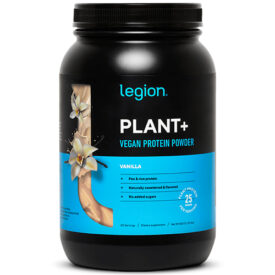
Legion's Plant+ has 25 grams of protein per serving, just four grams of carbs, and is packed with vitamins and minerals that plant-based eaters may want more of. Use code "BARBEND" for 20% off!
Specs
- Protein Per Serving: 24g
- Calories Per Serving: 130
- Key Ingredients: Pea protein, brown rice protein concentrate, pea creamer, natural flavors, salt, steviol glycoside, xanthan gum, tree nuts
- Third-Party Tested: Yes
- Flavors: Cinnamon Cereal, Dutch Chocolate, French Vanilla, Salted Caramel, Apple Pie, Mocha Cappuccino
- Added Sugar: 0g
- Price Per Serving: $2.50 and $2.00 with a subscription
Plant-based protein powders often don’t contain as much protein as their whey counterparts, but Legion Plant+ has an impressive 24 grams of protein per serving and only 130 calories. This protein supplement has a great macro profile and, as a certified nutrition coach, I think this makes a great high-protein snack without adding other macronutrients.
Chelsea Rae Bourgeois, a registered dietitian and our expert reviewer, also likes the macros, saying: “I really like Legion Plant+ as a vegan protein powder. You get 24 to 25 grams of protein per scoop, all from high-quality, plant-based sources. Plus, there’s no added sugar, and the fat and carb content is controlled so you can boost your protein intake without skewing your other macros much.”
Overall, Bourgeois gives Legion Plant+ a 3.75 out of 5, attributing the deductions to the “sodium content and limited vitamin and mineral profile.”
A lot of our testers mention the taste being overly sweet and in some cases making them more hungry. One of our product testers says, “I feel like drinking this made me more hungry. I had this before I made dinner and then I was craving a sweet dinner option. So I feel like it would be hard for me to say this would make me feel satiated.”
Another product tester of ours describes the Dutch Chocolate flavor as “smooth and a mid-level thickness (think a viscous chocolate milk). I liked it.”
The good news is that Legion Plant+ mixes well even without a shaker. One of our product testers says: “I didn’t have a shaker so I mixed it with water in a glass with a knife (not recommended), but I was surprised that it actually mixed! It got smooth after about a minute of stirring.” They rate the solubility 4 out of 5 “because there were clumps but again I mixed it in a way that I wouldn’t have… I’m sure if I used a shaker it would have been 5 out of 5.”
Read our full Legion Plant+ Protein Review.
Best Pea Protein Powder for Athletes: Ritual Essential Protein 18+
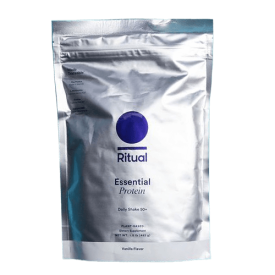
This clean, transparent protein powder relies on organic, non-GMO yellow peas for its 20-gram protein dosage. Additionally, the subscription-based model helps ensure you’re always stocked up to help you meet your nutritional goals day in and day out.
Specs
- Protein Per Serving: 20g
- Calories Per Serving: 115
- Key Ingredients: Organic pea protein, natural flavor, organic MCT oil, xanthan gum, salt, sunflower lecithin, Reb-M, mixed tocopherols, organic monk fruit extract
- Third-Party Tested: Yes
- Flavors: Vanilla
- Added Sugar: 0g
- Price Per Serving: $2.35
Ritual’s Essential Protein 18+ is a great pea protein for athletes because it’s third-party tested by Informed Sport. This certification means that it meets the gold standard in quality control and manufacturing standards for sports nutrition. Essential Protein passes rigorous testing for more than 250 banned substances in sports competitions. This is vital for athletes who cannot take certain substances before their competitions.
Registered dietitian and our expert reviewer Chelsea Rae Bourgeois likes the third-party testing, remarking: “I’m a huge fan of companies that are transparent with their formulas, and Ritual’s got that down to a science. Essential Protein Daily Shake is third-party tested and made with traceable ingredients, so you know exactly what you’re putting in your body and where it came from.” Bourgeois ultimately scores Ritual Essential Protein as 4.5 out of 5 “for its formulation with deductions for the sodium content.”
Not only is Essential Protein athlete approved — it’s also has a great taste and solubility. Almost all our testers rate it 5 out of 5 in both. One says: “When mixed with water alone I was surprised at how thick the solution was. Pro-tip: throw it in a blender for 10 seconds if you want an extra smooth and creamy finish.”
Kate Meier, a certified personal trainer and BarBend editorial team member, gives the texture a 5 out of 5, saying: “This has a shockingly great consistency. Mixed in water, it dissolves, and it also has a really smooth texture. It’s not thick, but it’s not watery like some proteins are.”
Meier goes on to say: “Even just with water, this has a nice taste. It’s not super plant-y or hemp-y like some vegan protein powders are. There is a very slight chalky aftertaste with water — but I could drink this with water alone and be fine with it. That’s how decent I think this taste is.” She scores the taste 4 out of 5.
The one thing Meier doesn’t like is the closing mechanism. “It’s almost like a Velcro, and the protein gets stuck in it and makes it hard to seal.”
Best Unflavored Pea Protein Powder: Bulk Supplements Pea Protein Isolate
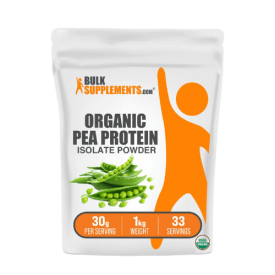
Vegan, organic, and lactose-free, this protein powder provides 21 grams of protein, 2.6 grams of fat, and 0 carbs per serving.
Specs
- Protein Per Serving: 21g
- Calories Per Serving: 110
- Key Ingredients: Pea protein isolate
- Third-Party Tested: No
- Flavors: Unflavored
- Added Sugar: 0g
- Price Per Serving: $1.23 or $1.11 with a subscription
Bulk Supplements Pea Protein Isolate is our favorite unflavored protein because of its basic and straightforward formula. It’s unflavored and only contains pea protein isolate. Because it’s unflavored, it won’t add any additional flavors to the baked goods, so that makes it great for baking protein snacks.
Our expert tester, a certified nutrition coach, says that if you’re not used to pea protein, you may be in for a surprise in beverage form. “If you don’t know what pea protein tastes like, you’ll find out very quickly with this,” they explain. But drinks are not your only option with this supp. “It works excellently with baking,” our tester reports, scoring this a 3 out of 5 for taste.
Another one of our experts and BarBend editorial team member Alex Polish — whose go-to protein powder is of the pea variety — says it’s easy to dress up the flavor. “All you have to do is toss this into the blender with your favorite fruits and it’ll take care of the pea flavor. You can also go for a solid peanut butter and chocolate mix to cancel any unwanted flavor right out.”
As a certified nutrition coach, I like its minimal formula and that it’s third-party tested. On the other hand, I don’t like that the certifications and the documentation of this testing are harder to find than some other brands. Brands like Legion and Transparent include the certificate in the photo carousels on the website — these were a bit hard to find.
It’s unfortunate that each container only has 17 servings — that’s not that much if you’re going to put away a shake each day. Luckily, you can buy in bulk, which will also help you save more.
[Related: Pea Protein Vs. Whey Protein]
Best Organic Pea Protein Powder: Orgain Organic Vegan Protein Powder
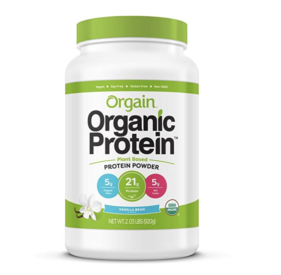
Orgain Organic Protein Plant Based Powder offers 21 grams of protein per serving, along with 5 grams of fiber and net carbs!
Specs
- Protein Per Serving: 21g
- Calories Per Serving: 150
- Key Ingredients: Organic pea protein, organic brown rice protein, organic chia seeds, organic acacia, organic high oleic sunflower oil, organic rice dextrin, organic sunflower lecithin, organic rosemary extract, organic erythritol, organic alkalized cocoa, organic natural flavors, sea salt, organic Reb A (stevia extract)
- Third-Party Tested: No
- Flavors: Creamy Chocolate Fudge, Chocolate Caramel Sea Salt, Chocolate Peanut Butter, Churro Caramel Swirl, Cookies ‘n Cream, Fruity Cereal, Horchata, Iced Coffee, Natural Unsweetened, Peanut Butter, Strawberries & Cream, Vanilla Bean, Vanilla Horchata
- Added Sugar: 0g
- Price Per Serving: $1.90 or $1.61 with a subscription
Orgain Organic Vegan Protein Powder is a certified USDA organic, vegan pea protein powder. We’ve named this our best organic protein powder because we love the blend of rich organic ingredients as well as the variety of flavors available. The organic nature of the ingredients does mean you will be paying a bit more than some of the other proteins ($1.90 per serving or $1.61 with a subscription), but the plus side is that you’re getting all the organic goodness in there.
Most of our testers recommend using a blender to mix this protein. One tester says: “It’s difficult to mix in a regular blender bottle, so definitely use an actual blender.” Another mentions that “it mixed really well for me in a shaker bottle with a shaker ball. It also mixes up really well in a blender.”
One of our other testers speaks very highly, saying: “This is my favorite plant-based protein — specifically the Creamy Chocolate Fudge — because it tastes good, like hot cocoa, and the texture isn’t as gritty as most other protein powders I’ve tried. And even though it’s made with pea protein, it tastes less like peas than most of the other pea proteins I’ve tried.”
Another tester mentions the texture positively, explaining: “This is one of the smoother plant protein powders I’ve tried. There is definitely a little grit, but the creamer case really does give it a creamy texture. I don’t notice the grit at all when I blend this protein powder in a smoothie. The Chocolate flavor tasted less gritty than the Vanilla Bean, which is unusual, in my experience.”
As a certified nutrition coach, I am wary of anything containing erythritol as it can cause inflammation in the gut for some people, but one of our testers points out they were also worried about the erythritol, but experienced no side effects. They say: “I drink this protein regularly and never have any issues. Sometimes it even helps my digestion (if you know what I mean).”
Read our full Orgain Organic Vegan Protein Powder Review.
Benefits of Pea Protein Powder
Pea protein comes from legumes, specifically yellow split peas or green peas, and in many ways has the same benefits as its dairy counterpart, whey. The main benefit of both is building and repairing muscle post-workout.
The main characteristic that sets pea protein apart is that it’s free of most allergens. It’s completely vegan, gluten and soy-free (unless, of course, it’s blended with soy protein powder). It’s a great source of protein, especially for those with dietary restrictions. It provides a large amount of protein without being hard on the stomach.
Just because it’s vegan, don’t think that pea protein doesn’t share the general protein powder benefits boasted by its animal-based counterparts. Here we go:
- Easier on the Stomach: Pea protein is easy to digest and is less likely to cause bloating or digestive discomfort. It does digest slower than whey protein powder, but it’s free from common allergens like dairy, gluten, and soy, making it a good option for people with food sensitivities and dietary restrictions.
- Supports Muscle Growth: Similar to whey protein, pea protein is high in protein, which allows for effective muscle growth and recovery post-workout. This makes it a good alternative to whey protein, especially for vegans or those with lactose intolerance. (2)(3)
- Sustainable: Compared to animal-based protein powders, pea protein is more sustainable. Peas require less water and land to grow and have a lower carbon footprint, making pea protein a more environmentally friendly choice. (3)(4)
- Rich in Micronutrients and Antioxidants: Pea protein powder has more iron and fiber in it than whey protein powder. This is particularly beneficial for those with a plant-based diet who may sometimes struggle to get a sufficient amount of iron. (5)(6) Pea protein is also a great source of antioxidants, which help inflammation. (7)
How Much Does Pea Protein Powder Cost?
Let’s face it. Protein is such a nutrient-dense macronutrient that it’s hard to make it well without it being expensive. Fortunately, pea protein is a relatively lower-cost protein than some other sources.
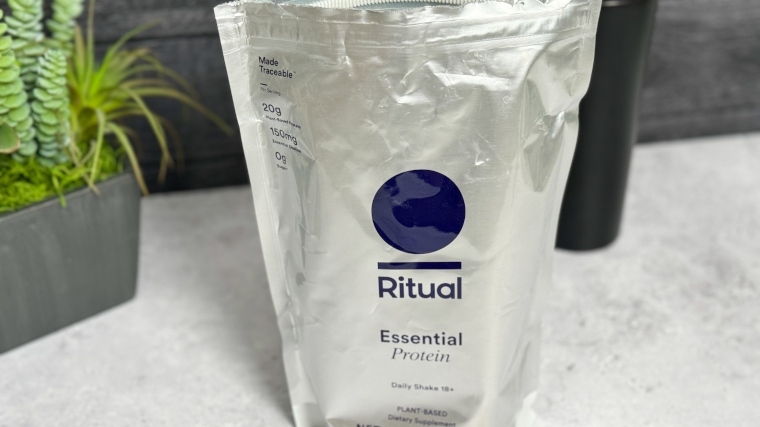
These premium pea protein powders range from $20.96 to $79.99 per tub. It’s important to keep in mind that the serving sizes and added ingredients will dramatically affect the price of each of these protein supplements. You will also see additional savings with a subscription or when ordering in bulk.
| Superlative | Supplement | Price |
| Best Overall Pea Protein Powder | Transparent Labs Rice & Pea Protein | $49.99 or $44.99 with a subscription |
| Best Tasting Pea Protein Powder | Gainful Plant-Based Protein Powder | $45 plus more savings when purchasing in bulk |
| Best Budget Pea Protein Powder | Nutricost Organic Pea Protein Isolate | $32.95 or $26.36 with a subscription |
| Best Pea Protein Powder for Muscle Gain | Transparent Labs Vegan Mass Gainer | $79.99 or $71.99 with a subscription |
| Best High-Protein Pea Protein Powder | Legion Plant+ | $49.99 or $39.99 with a subscription |
| Best Pea Protein Powder for Athletes | Ritual Essential Protein 18+ | $44 |
| Best Unflavored Pea Protein Powder | Bulk Supplements Pea Protein Isolate | $20.96 or $18.86 with a subscription and more savings in bulk |
| Best Organic Pea Protein Powder | Orgain Organic Vegan Protein Powder | $37.99 or $32.29 with a subscription |
What to Consider Before Buying Pea Protein Powder
There are many factors to consider before making an informed choice on which pea protein is right for you. The first step is knowing how much protein you should be consuming a day. For an easy way to calculate your needs, check our BarBend’s protein intake calculator:
Protein Intake Calculator
[Related: Protein Intake Calculator]
Essential Amino Acids
While whey protein contains all nine essential amino acids that your body needs, pea protein doesn’t always contain enough of all nine to count as the complete package. (8)(9) These essential amino acids, like the branched-chain amino acids (BCAAs) leucine, isoleucine, and valine are essential for your body’s functioning.
Amino acids provide energy to break down food and aid with digestion, boost the immune system, help the body absorb nutrients, aid hormone production, maintain healthy skin, hair and nails, and help with growing and repairing body tissue and muscle. (10)
They are especially important for those on a plant-based diet because the biggest sources of these essential amino acids come from meat, dairy, and eggs, so supplementing them can be helpful for your overall health if you’re not the most mindful of your food intake.
Combining pea protein with another vegan protein like rice protein powder is the best way to ensure that your protein contains all nine essential amino acids.
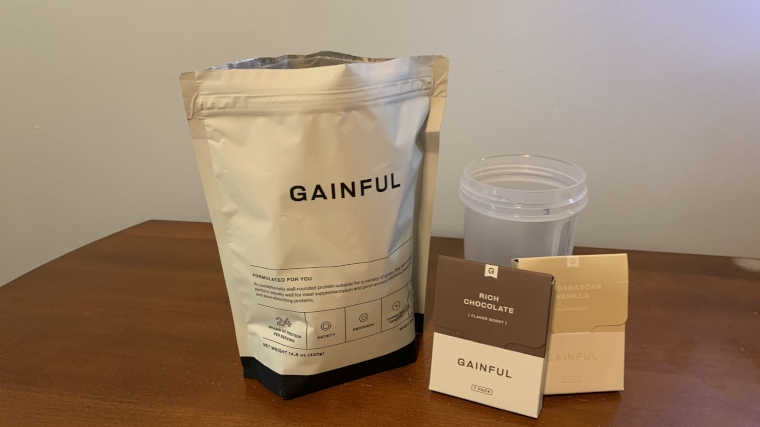
According to Leona West Fox, CN, CH, FMCHC: “If a person is taking protein powder specifically to fill any protein gaps in the day and after their workout to maximize protein muscle synthesis, then it’s important to choose protein powder with a higher leucine content. I recommend pea protein in the plant protein category.”
[Related: Pea Protein Benefits]
Added Ingredients & Nutrients
Selecting the pea protein with the best ingredients for you depends on your goals. For example, if you want to lean out or lose weight, selecting a protein powder that is high in protein but little else may be the best choice for you. If you want to build mass, you may lean toward a protein that includes carbohydrates and healthy fats. (Transparent Labs Vegan Mass Gainer, anyone?) If you want your protein to assist with digestion, perhaps look for one with added fiber or probiotics.
Taste & Solubility
Of course, we know the importance of macros and eating a whole, nutritious diet, but taste and solubility are also huge factors when selecting the right protein for you. Why make yourself drink it if it doesn’t taste good? Life is too short to drink a bad-tasting protein powder. (Instead, why not try one of our best-tasting protein powders?)
If you’re using it for baking, maybe you’d prefer an unflavored protein that would be masked easily (like Bulk Supplements Pea Protein Isolate). If you are mixing it with just milk or water, does it blend well by shaking the bottle? These are all individual considerations that only you can determine.
Pea Protein Powder FAQs
Which is better: pea or whey protein?
The short answer is that it depends on what your goals and preferences are. A recent study found that supplementing with whey or pea protein can result in similar strength, performance, body composition, and muscular adaptations. (2)(3) It can also depend on your dietary preferences. If you are lactose intolerant or vegan, pea protein will be the better option for you. Pea protein digests faster and easier than whey. Some people also have a stronger preference on the taste and texture. Whey is higher in calcium, but pea protein has more iron. (5)(6)
Is pea powder a good protein?
Yes. Pea powder comes from legumes and is a great source of protein. While whey may have a few more grams of protein per serving, pea protein powder is still just as good for muscle growth and recovery. (2)(3) Just make sure you are taking it with another protein powder that includes methionine. Pea protein by itself is low in this essential amino acid. The best protein powders will include methionine to be a complete source of all the essential amino acids. (8)(9)
Is it safe to drink pea protein every day?
Yes, it is generally safe to drink pea protein every day, as long as it fits into your overall diet and nutritional needs. It’s very important to get enough protein in a day. It’s recommended for healthy adults to consume between 0.8 and 1 grams per kilogram of body weight of protein daily depending on physical activity. (11) On the flip side, any nutritionist will tell you too much of anything isn’t good for you, so as long as you have a balanced diet and get protein from other sources, it’s safe to drink every day. When in doubt, always consult Wwith your healthcare professional.
How do I choose pea protein powder?
First, pick a pea protein powder that is from a transparent brand that allows third-party testing. This will ensure that you’re getting a high-quality protein with non-toxic ingredients. Next, make sure that the protein has all essential amino acids. (8)(9) The rest depends on your goals, personal preferences, and price range. Pick ingredients that align with your goals and tastes. The best protein powders for building mass and bulking will have added ingredients like healthy sources of carbs and fats. If you’re looking to lean out or lose weight, pick a Wprotein powder that doesn’t have a lot of added ingredients.
What is the best-tasting pea protein powder?
We’ve deemed Gainful Plant-Based Protein Powder the best-tasting protein powder because of its variability in flavors and how much our testers enjoyed the taste. For a more affordable option, you can try Legion Plant+.
Do you have to refrigerate pea protein powder?
No — pea protein powder is shelf-stable and doesn’t need to be refrigerated. For best use, most can be stored in a cool, dry placee. Make sure to read the individual labels for the best way to use and store each product.
References
- Lopez MJ, Mohiuddin SS. Biochemistry, Essential Amino Acids. 2025 Apr 30. StatPearls Publishing.https://www.ncbi.nlm.nih.gov/books/NBK557845/
- Banaszek, A., Townsend, J. R., Bender, D., Vantrease, W. C., Marshall, A. C., & Johnson, K. D. (2019). The Effects of Whey vs. Pea Protein on Physical Adaptations Following 8-Weeks of High-Intensity Functional Training (HIFT): A Pilot Study. Sports (Basel, Switzerland), 7(1), 12. https://doi.org/10.3390/sports7010012
- Loureiro, L. L., Ferreira, T. J., Cahuê, F. L. C., Bittencourt, V. Z., Valente, A. P., & Pierucci, A. P. T. R. (2023). Comparison of the effects of pea protein and whey protein on the metabolic profile of soccer athletes: a randomized, double-blind, crossover trial. Frontiers in nutrition, 10, 1210215. https://doi.org/10.3389/fnut.2023.1210215
- Wu, D. T., Li, W. X., Wan, J. J., Hu, Y. C., Gan, R. Y., & Zou, L. (2023). A Comprehensive Review of Pea (Pisum sativum L.): Chemical Composition, Processing, Health Benefits, and Food Applications. Foods (Basel, Switzerland), 12(13), 2527. https://doi.org/10.3390/foods12132527
- USDA (2020, December 19). Historical Record: Whey Protein Isolate Protein Powder. Food Data Central. https://fdc.nal.usda.gov/fdc-app.html#/food-details/1162804/nutrients
- USDA (2020, December 19). Historical Record: Organic Pea Protein Powder. Food Data Central. https://fdc.nal.usda.gov/fdc-app.html#/food-details/1162804/nutrients
- Shanthakumar, P., Klepacka, J., Bains, A., Chawla, P., Dhull, S. B., & Najda, A. (2022). The Current Situation of Pea Protein and Its Application in the Food Industry. Molecules (Basel, Switzerland), 27(16), 5354. https://doi.org/10.3390/molecules27165354
- Gorissen, S. H. M., Crombag, J. J. R., Senden, J. M. G., Waterval, W. A. H., Bierau, J., Verdijk, L. B., & van Loon, L. J. C. (2018). Protein content and amino acid composition of commercially available plant-based protein isolates. Amino acids, 50(12), 1685–1695. https://doi.org/10.1007/s00726-018-2640-5
- Shanthakumar, P., Klepacka, J., Bains, A., Chawla, P., Dhull, S. B., & Najda, A. (2022). The Current Situation of Pea Protein and Its Application in the Food Industry. Molecules (Basel, Switzerland), 27(16), 5354. https://doi.org/10.3390/molecules27165354
- National Research Council (US) Subcommittee on the Tenth Edition of the Recommended Dietary Allowances. (1989).Recommended Dietary Allowances: 10th Edition. Washington (DC): National Academies Press (US). 6, Protein and Amino Acids. https://www.ncbi.nlm.nih.gov/books/NBK234922/
- Cleveland Clinic. (2024, June 7). “How Much Protein Do You Need? And How To Get It”. Cleveland Clinic. https://health.clevelandclinic.org/how-much-protein-you-need
